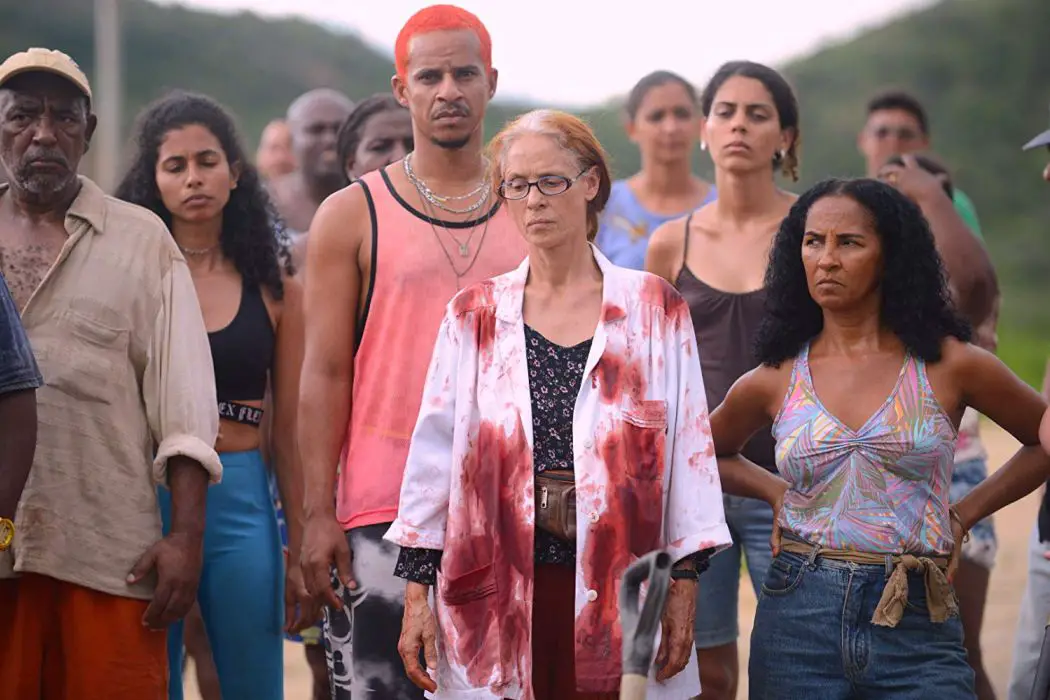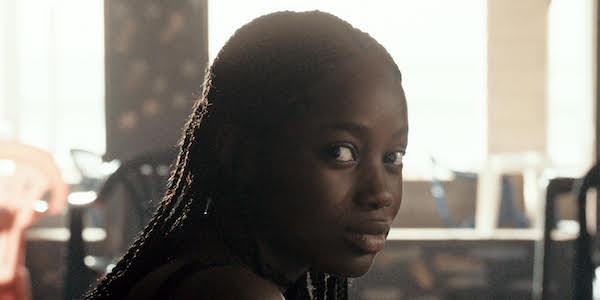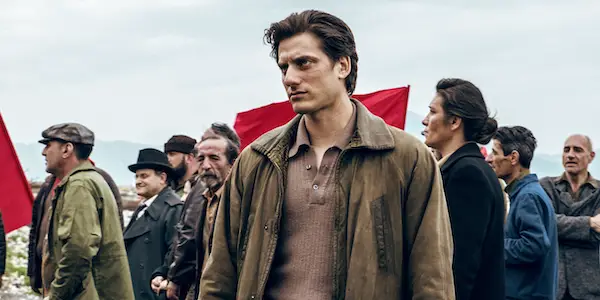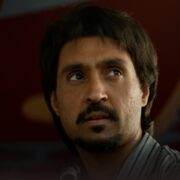NYFF 2019: ATLANTICS, BACURAU, MARTIN EDEN

Full time advertising copywriter, part time Jake Gyllenhaal stan. Always…
NYFF 2019 press screenings kicked off the day after TIFF 2019 ended. Needless to say, I was still exhausted, but running on festival energy is getting me through. I looked forward to the NYFF lineup especially because it features such a diverse group of largely foreign films.
It’s unique in that nature and gives me a chance to see stuff that may not be shown in many theaters later in the year. I’ve been pacing out my screenings, but three that especially caught my eye were Atlantics, Bacuraru, and Martin Eden.
Atlantics (Mati Diop)

Senegal is a country that doesn’t often cross the mind. The often exploited working class of Senegal crosses it even less. Which is why it’s so extraordinary to see Atlantics from director Mati Diop, a film that brings their plight to the forefront.
Set in the capital city of Dakar, a group of workers – including Souleiman (Ibrahima Traoré) aren’t getting paid for their work on a state of the art building for the rich, so they quit. You can sense the group is at the end of their rope, especially when Souleiman meets up with his girlfriend Ada (Mame Bineta Sane).
We soon learn Ada is engaged to be married to a wealthy man named Omar (Babacar Sylla). Ada’s parents distrust her so much that they make her take a virginity test before her wedding. Meanwhile, Souleiman and his cohort take to the sea, bound for Spain. They’ll never be seen again. She hears that his body has washed up in a fisherman’s net.
Suddenly, the film takes a turn to something unexpected and supernatural. On her wedding night, Ada’s nuptial bed inexplicably goes up in flames. Naturally, Souleiman is the main suspect – only he’s nowhere to be found. More inexplicable events take place, that I won’t spoil, but the film is one that keeps you guessing until the very last moments.
Even if Atlantics is on the slow side and lacks a lot of the splash of other films in the same genre, it feels poignant for the world it takes place in. Ada is a young woman torn. She’s torn between the rich man and easy life she’s engaged to and the man she actually loves. The man who died in search of a better life, but now may be back. She’s torn between her religion and her friends. She’s certainly more conservative than her friends, but she also sneaks out at night and hides her outfits from her family.
It’s a film that works because the message covers up flaws in the execution. Atlantics gives a voice to the exploited working class of Senegal. It captures their rage and sets literal fire to those that oppress them. It’s also a touching story of love and love lost. Of dealing with grief. While Diop does an outstanding job building atmosphere, especially with her use of shadows, she can’t find a great balance between the story of the working class, Souleiman’s story and Ada’s journey to find her place. Atlantics is a film that sticks with you, even if the journey to get there isn’t always the best.
Bacurau (Juliano Dornelles and Kleber Mendonça Filho)

When I first heard about Bacurau from writers and directors Juliano Dornelles and Kleber Mendonça Filho, all I knew was it was about a small Brazilian town standing up for itself against a group of armed mercenaries. And while that summary is technically true, it understates Bacurau a great deal.
When we first arrive in the very small, close knit town of Bacurau, Teresa (Barbara Colenit) has just arrived home for her grandmothers funeral. Her grandmother was the matriarch of the town and everyone has gathered together to say goodbye. How small is Bacurau? Well, the teacher in town can’t even find it on the map. But for as small as the town is, the townspeople have personality to make up for it. It’s a bit of a rag tag group, but there’s no mistaking the charm and bond between everyone.
The film takes a turn from being a portrait of the small quirky town to something more sinister and frankly more fun. When two strangers role into town on motorbikes, sparking suspicion among everyone in Bacurau.
Turns out it’s for good reason, the pair are part of an armed group of mercenaries. The group is essentially a vacation tour for white people to go murder and exterminate small towns. The townspeople organize and prepare to protect their home. Things get wild to say the least. There are UFO drones, white people getting off (literally) on murder, an entire town on drugs and plenty of more surprises in store. It’s hyper violent and super fun.
It’s delightful mishmash of genres and ideas that works way better than it should. There are elements of a Tarantino-like Western, science fiction and a more traditional drama/thriller. Bacurau defies labels and expectations, and works because of it. Each frame shows off two filmmakers so self-assured that they weren’t out to please anybody. Bacurau might not be the best film you see all year, but it will be the most surprising and quite possibly the most interesting.
Martin Eden (Pietro Marcello)

Jack London was well known as a socialist. I recently found out that because of this, he struggled greatly with his own success as it led him to great wealth. In that way, Martin Eden (originally the book, and now the film) feel somewhat as an expression of this feeling. It’s full of his own rage and much of his own story from an uneducated sailor to literary great.
Writer and director Pietro Marcello has transported and reinterpreted the novel. In Naples, we meet Martin Eden (Luca Marinelli) is an uneducated sailor who falls in love with the wealthy and well-educated Elena (Jessica Cressy). To impress her and her family, he decides he will educate himself by reading as much as he can. Eventually, he decides to become a writer.
Eden is rejected constantly by the literary world and is pushed by both the world he comes from and Elena to get a paying job while he works on his writing. Eden refuses, going to the country to work on his stories. His stories are full of anger sadness, something Elena tells him will never sell. But that’s who he is. It’s the world he comes from. Eventually, once Elena has left him, Martin does sell a story and goes on to become a brilliant, beloved writer.
Early on in Martin Eden, Martin looks at a painting and says, “It’s beautiful from a distance, but close up you can only see stains.” It’s a quote that, maybe obviously, is speaking about the man himself. From afar, he has it all – looks, charm and the girl of his dreams. But when you look closer, you see his struggle. He hates being in the working class. He hates being labeled as either being a socialist or a capitalist. He yearns for an education and literary success. And even when he achieves success, he isn’t happy.
Amidst all of the story of Eden’s personal identity evolution, is a story of love, politics and class. Eden is fiercely an individualist, and seems to reject both socialism and capitalism. He sees liberalism as a lie and socialism as slavery. There’s a lot of commentary on class and politics, a lot of which I found fascinating, even if I wasn’t always able to fully grasp it.
The film is undeniably beautiful. It fluctuates between crisp, colorful shots from a neutral perspective and grainy, slightly out of focus 16mm footage when we see the world from Eden’s point of view. It’s a great contrast to show how differently the man sees the world than those around him. He’s so burdened by everything, the world appears different. It’s what makes him a great writer, but also why he cannot be happy.
Marcello has crafted a visual delight and Marinelli brilliantly brings a complex character with a captivating arc to life. Martin Eden serves a lot on its plate. Between so many themes, sometimes it can feel like too much at once, but never boring.
Does content like this matter to you?
Become a Member and support film journalism. Unlock access to all of Film Inquiry`s great articles. Join a community of like-minded readers who are passionate about cinema - get access to our private members Network, give back to independent filmmakers, and more.
Full time advertising copywriter, part time Jake Gyllenhaal stan. Always waiting for a new film from Benh Zeitlin.













